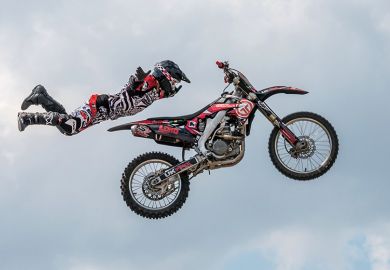As Covid vaccination rates increase and restrictions are lifted, many faculty and administrative staff are planning to return to campus – if they haven’t already. But to suggest that things will soon be “back to normal” would be to belittle the experience we have all been through over the past academic year.
As a department head, I recognise that many faculty still do not want to be on campus because they fear Covid variants running rampant. For those faculty members in a high-risk category, such fears have particular merit.
Another factor is the habit we’ve all been conditioned into of wearing a mask and isolating from others. We’ve become uncomfortable in the close proximity of other people – especially crowds. That feeling won’t be easily shaken off.
Furthermore, I’ve spoken with US faculty who have admitted they are vaccinated but still wear their mask because they don’t want to be perceived as a “Trump supporter”. The politicisation of masks is a result of the 2020 election season, from which many have still not healed.
Many human resources departments are rushing to write policies for their organisation post-Covid. But they need to be careful. Telling faculty that they have to be on campus a certain number of hours a day, even if they don’t have classes that day, will not be well received. If a faculty member is teaching their classes, responding to student issues and grading in a timely manner, I would question how HR can reasonably demand that department heads like me force our faculty to be on campus full time. Indeed, how can senior leaders expect me to be on campus five days a week, either, when I’ve satisfactorily performed my work duties entirely from home for more than a year?
Formulating and enforcing new, post-Covid expectations will require all levels of management to walk a fine line. Sadly, many of us are not prepared for the required shift in mindset.
The concept of situational leadership is worth reflecting on. While the model, developed by Paul Hersey and Ken Blanchard in the 1960s, acknowledges that there is no perfect leadership style, it urges leaders to strike a balance between task and relationship roles. With each situation that emerges, they should assess whether it is an opportunity to complete a task or an opportunity to enhance a relationship. Too many times, leaders are quick to jump in and resolve a problem without first asking if their help is desired.
For example, if an instructor is venting about a student in their classroom who is sending rude emails or doing something else to get under their skin, asking a simple question: “How can I help?” can go a long way. The faculty member may reply that they don’t want you to do anything; they only wanted you to listen. If so, respect that. Be careful not to overstep your leadership purpose even if you are trying to make up for time lost while working from home last year.
Also ensure that in departmental meetings and one-on-one discussions, dialogue is open and respectful. Even if you don’t agree with others’ perspectives about Covid and its implications for organisational operations, listening to their point of view can go a long way towards building relationships with them.
Instead of automatically scheduling a departmental meeting in the “usual” manner, for instance, you might consider sending out a survey to ask faculty how they prefer to meet: face-to-face or online. Maybe the best solution will be a mixture of the two throughout the year, to balance out the needs of all faculty members.
Moreover, remember that openness and consideration are two-way streets. Some leaders think vulnerability shows weakness, but the truth is quite the opposite. If you are struggling to focus after returning to campus – because of having to wake up earlier, fight the traffic, make childcare arrangements or whatever else – let your team know. Depending on the situation, you may not be able to provide all the details, but if you are open about working through issues and trying to maintain a positive attitude throughout the process, your team will notice. Their behaviour is a direct response to your behaviour and authenticity as a leader.
Moreover, their behaviour also affects students – who have already been through so much during the past academic year. Let’s do everything we can to avoid asking them to face more issues in the classroom when many are just excited to be returning to a traditional college experience.
Teaching students really does take all of us. The Duke University basketball coaching legend Mike Krzyzewski described leadership as “an ever-evolving position”. That has never been more true than it is now.
Rachel Gallardo is head of the department of psychology and anthropology at Blinn College, Texas.
Register to continue
Why register?
- Registration is free and only takes a moment
- Once registered, you can read 3 articles a month
- Sign up for our newsletter
Subscribe
Or subscribe for unlimited access to:
- Unlimited access to news, views, insights & reviews
- Digital editions
- Digital access to THE’s university and college rankings analysis
Already registered or a current subscriber?








